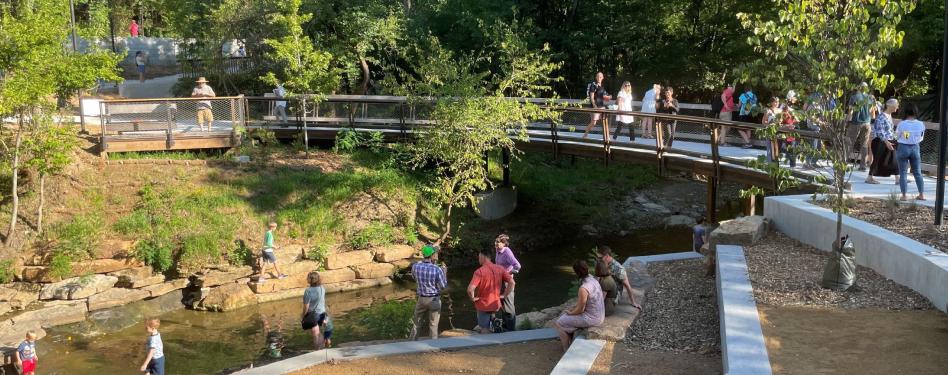
Feature image: The SITES-certified Cultural Arts Corridor: The Lower Ramble in Fayetteville, Arkansas. Image credit: Watershed Conservation Resource Center.
For Earth Day, USGBC is investing in our planet. Our nature-based solutions strategy, which was submitted to the White House “Invest in Nature” call to action for nature-based commitments and investments, will guide us in creating new opportunities for learning, and increasing access to, nature-based solutions.
To create more awareness and reach new audiences:
- USGBC will promote nature-based education in our course catalog by offering free courses related to the SITES program for Earth Day (through May) and publishing a playlist of nature-based solutions courses.
- USGBC will connect experienced professionals with others who are seeking education in nature-based solutions and SITES, collaborate with organizations who represent or convene diverse or disadvantaged landscape professionals to understand their needs, and provide a free virtual introduction to SITES, along with discounts to the SITES AP credential.
- In addition, USGBC will emphasize nature-based solutions in the biodiversity-themed summer issue of USGBC+ and create new training and education where needs are identified.
To enable schools, teachers, and educators to deliver more nature-based lessons:
- USGBC and the Center for Green Schools will expand access to the Learning Lab by offering the Learning Lab Natural Systems theme content for free from April 20–May 4 and offering scholarships to educators in schools with low resources. USGBC will also curate a list of lessons that support educators in giving PreK–12 students hands-on experiences or outdoor education in natural environments outside the classroom.
- In addition, the Center for Green Schools will host a nature-based solutions webinar with the School Sustainability Leaders Network and support relevant research on topics such as the cognitive, social and health effects of green learning environments.
To improve the resilience of our cities and communities:
- USGBC’s LEED for Cities and Communities program will strengthen the Natural Systems and Water Efficiency category, adding biodiversity, urban forest management plans, new strategies around stormwater management, and a strengthened resilience planning credit that awards cities that are improving resilience.
- Building on existing resources such as the “Ensuring Access to Urban Green Spaces” case study, USGBC plans to develop additional resources and free training that illustrates the opportunities for nature-based solutions in cities and educates local government staff on the benefits of nature-based solutions.
Through the commitments outlined in our nature-based solutions strategy, USGBC will expand access, awareness, education and use of nature-based solutions.
